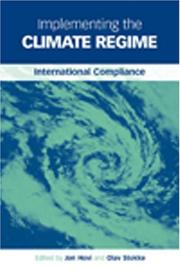| Listing 1 - 3 of 3 |
Sort by
|
Book
Year: 1998 Publisher: London : Pinter,
Abstract | Keywords | Export | Availability | Bookmark
 Loading...
Loading...Choose an application
- Reference Manager
- EndNote
- RefWorks (Direct export to RefWorks)

ISBN: 113656330X 1280475196 9786610475193 1849771685 6000000707 1417583118 9781849771689 9781844071616 1844071618 9781280475191 9781417583119 6610475199 9786000000707 9781136563256 9781136563294 9781136563300 9781138992405 1136563296 Year: 2005 Publisher: London ; Sterling, Va. : Earthscan,
Abstract | Keywords | Export | Availability | Bookmark
 Loading...
Loading...Choose an application
- Reference Manager
- EndNote
- RefWorks (Direct export to RefWorks)
Global warming is the most severe environmental challenge faced by humanity today and the costs of responding effectively will be high. While Russia's ratification of the Kyoto Protocol ensures the treaty's entry into force, lack of capacity, or incentives to renege on their commitments, will impede mitigation efforts in many countries. An important prerequisite for the proper functioning of the Protocol is that its compliance system - which is spelled out by the Marrakesh Accords - proves effective. Implementing the Climate Regime describes and analyses Kyoto's compliance system. Organized in
Climatic changes. --- Climatic changes --- Greenhouse gas mitigation --- Changes, Climatic --- Changes in climate --- Climate change --- Climate change science --- Climate changes --- Climate variations --- Climatic change --- Climatic fluctuations --- Climatic variations --- Global climate changes --- Global climatic changes --- Climatology --- Climate change mitigation --- Teleconnections (Climatology) --- Government policy. --- International cooperation. --- Environmental aspects --- United Nations Framework Convention on Climate Change --- Jingdu tiao yue --- Jingdu xie yi shu --- Jingdu yi ding shu --- Konvensi Perubahan Iklim --- Kyōto giteisho --- Kyoto Protocol --- Kyoto Treaty --- Lian he guo qi hou bian hua kuang jia gong yue de Jingdu yi ding shu --- Protokol Kyoto --- Protokol Kyoto Untuk Konvensi Kerangka Kerja PBB Tentang Perubahan Iklim --- 京都协议书 --- 京都条约 --- 京都議定書 --- 京都议定书 --- 联合国气候变化框架公约的京都议定书 --- Global environmental change --- Climatic changes - Government policy --- Greenhouse gas mitigation - International cooperation
Book
ISBN: 9780415643795 0415643791 Year: 2014 Publisher: Abingdon: Routledge,
Abstract | Keywords | Export | Availability | Bookmark
 Loading...
Loading...Choose an application
- Reference Manager
- EndNote
- RefWorks (Direct export to RefWorks)
"This book examines the challenges of sustaining meaningful cooperation among countries striving to manage global climate change through international environmental agreements. Through the perspectives of leading international scholars from multiple disciplines, readers of the book will gain an understanding of how agreements are negotiated, the strength and weaknesses of previous climate agreements and how a more effective future climate agreement can be designed"-- "Climate change is arguably one of the most pressing problems facing the global community. While most nations agree that climate change is occurring and is largely the result of humans' reliance on fossil fuels, managing a changing global climate is an impressive challenge. Underlying this challenge is the fact that nations are sovereign, and thus governed by their own rules and regulations. Sovereignty requires that nations address global problems, like climate change, through voluntary institutions typically referred to as international environmental agreements (IEAs). This book examines the challenges of sustaining meaningful cooperation among countries striving to manage global climate change through international environmental agreements. The first part of the book looks backwards to learn from climate diplomacy's past experience concerning the UNFCCC, the Kyoto protocol, and the Asia-Pacific Partnership. It considers the political process of international climate negotiations, provides critiques of existing climate agreements and also includes analyses of climate policy for large carbon-emitting countries (e.g., United States and China). It analyzes issues such as the strengths and weaknesses of the Kyoto protocol and its enforcement system, the rise and decline of the Asia-Pacific Partnership, the record of international and regional emissions trading, the experience with the UN track for climate negotiations, and the conditions under which unilateral measures by one or a few countries might encourage others to follow suit. The second part explores how future climate agreements can be improved based on the lessons of the past. This part presents and discusses ideas for a new and more effective international architecture for combating climate change. It analyses the relative merits of top-down and bottom-up agreements, considers the potential of sectoral agreements and technology agreements to constrain emissions, and examines theoretically and empirically various institutions for encouraging participation and compliance in a future climate agreement. Finally, it considers the ups and downs both of the UN negotiation track and of other possible forums for climate diplomacy. Through the perspectives of leading international scholars from multiple disciplines, readers of the book will gain an understanding of how agreements are negotiated, the strength and weaknesses of previous climate agreements and how a more effective future climate agreement can be designed. "--
| Listing 1 - 3 of 3 |
Sort by
|

 Search
Search Feedback
Feedback About
About Help
Help News
News